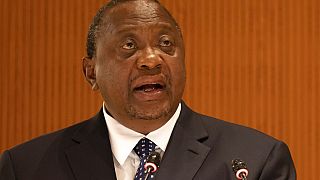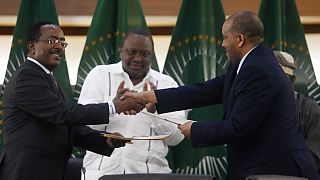Ethiopia
A fragile truce has allowed partial access to Tigray. But the long months of conflict have caused immense harm. Hospitals are damaged or destroyed. Water, electricity, and medicines are in short supply. Hunger, even among healthcare staff themselves, is everywhere. People have been displaced over and over again.
There’s nowhere we haven’t gone to hide with our children,” says an internally displaced person, who has fled the fighting twice from Adi Goshu Kebele. “Without a mattress, a cup of water to drink, anything to cook with, just us trying to save our lives. The elderly, mothers with children, and many others have been through tremendous difficulties. Many have died.”
Now, at last, some support is arriving—in time, it is hoped, to avert a major health crisis.
“Just yesterday in fact we were able to bring in the first big convoy of trucks,” says International Committee of the Red Cross (ICRC) team leader Alexander Sultan-Khan. “Sixteen trucks with 200 metric tonnes of food and medicine which will be prioritized to the health care facilities in north-west and central Tigray.”
But the needs are immense. The health system has been torn apart by fighting. Urgent cases can’t be evacuated as there is no ambulance service. Often working without pay, healthcare staff face unbearable choices as hundreds of thousands of people risk dying.
Selamit Gebremeskel Tesfay is a clinical nurse, and now acting director of the primary health care centre in Adi Daero. The scale of the destruction has made re-opening these health facilities virtually impossible. Instead, consultations take place outside.
“We can’t find anything in these burned-out buildings” she says. “In the maternity service, we don’t even have a couch, or a family planning kit, and even in the outpatient department there’s nothing, no shelves, no cleaning materials. There is so much we don’t have.”
“From what we have received and for future continued support, we do not have a couch in the delivery room, there is no oxytocin because there is no electricity. Though other support is needed, these are the most urgent needs.”
The ICRC has delivered medicines and medical equipment, as well as bedding, solar lamps and other items to support people who are displaced. But for Tigray’s children, there is one overriding need.
“Children under five years are malnourished,” says nurse Gebremedhin Berhe. “We can’t save some of these children just with medicine. They need food. And we haven’t received food yet. We give the children medicine now and they come back the second day in a worse condition. We know what is happening to them, but we can’t do anything about it. Children are in danger.”
Now that access by road is possible, food supplies have begun to arrive too.
“The health needs are certainly one of our priorities” says Alexander Sultan-Khan. “Food {needs} we’ve heard not only among the host community but also among the IDPs, we will also be supporting these populations with food that we will be distributing in the next few weeks.”
But supplies can only be distributed where there is access, and that’s not possible, yet, in all areas of Tigray. The ICRC stands ready to deliver assistance as soon as access is granted, says Alexander.
“We are hopeful that the parties will allow us to reach also some of the more hard-to-reach areas where we were providing assistance before the escalation of the conflict so that these populations who are currently cut off from all humanitarian assistance will also be able to be assisted. So this is what we are going to be working on in the next few weeks, ensuring that all the communities including those in the hard to reach areas are supported.”
For now, there is at least some relief for some civilians in Tigray. For Adi Goshu Kebele it seems to have come just in time.
“Being a mother, I live day and night without hope, without eating anything. I will live by drinking only water if I have to. But you can see all the difficulties in Tigray, and you have become hope for us. I do not have words to describe that.”
The ICRC is intensifying its efforts to help. The ICRC and the Ethiopian Red Cross Society (ERCS) are carrying out rapid assessments and supporting 27 hospitals and health centers with emergency medical supplies for first aid and surgery, food, water, and hygiene kits.












01:10
At least three killed after AU military helicopter crashes in Somalia's Mogadishu airport
Go to video
Red Cross closes Niger offices and foreign staff leave after junta's expulsion order
11:18
Africa Day: AU renews call for reparative justice {Business Africa}
01:30
African Union expresses concern over US president's new travel ban
02:00
EU and African Union ministers pledge to boost cooperation on peace, security and economy
Go to video
Khartoum accuses UAE of direct involvement in drone strikes on Port Sudan